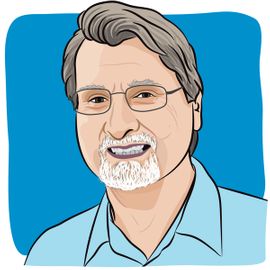- About Us
- Advertise / Support
- Editorial Board
- Contact Us
- CancerNetwork.com
- TargetedOnc.com
- OncLive.com
- OncNursingNews.com
- Terms & Conditions
- Privacy
- Do Not Sell My Information
- Washington My Health My Data
© 2025 MJH Life Sciences™ and CURE - Oncology & Cancer News for Patients & Caregivers. All rights reserved.
Youth Taught Me a Lot About My Cancer

Ron Cooper writes about the funny and serious sides of cancer. He is the author of “A Grateful Survivor” (Amazon) and blogs at RonCooperAuthor.com. Come along for the ride on his cancer journey!
When I was asked to speak to a youth service club about my cancer, they asked some meaningful questions, making me take stock of my experience.
Recently, a youth service club invited me to talk about my cancer journey. I’d like to think that I provided them with a good inside look at the cancer world.
But, it turns out, I learned a thing or two from them along the way.
As an eight-year cancer survivor, I thought long and hard about how to address these young people. As a starting point, I went to their website and discovered they were actively working on a fundraiser for a children’s cancer hospital in their community. They also interviewed other cancer survivors.
Still, I planned to speak with them in elementary terms, like a parent does to a child. My talking points included:
“It’s scary.”
“I was afraid I would get very sick.”
“I had surgery.”
“I got some medicine and got better.”
But then, two days before my talk, I received a list of probing questions from the group that made me pause and reconsider my approach. These questions included:
“What stage is your cancer in?”
“Was your tumor benign or malignant?”
“What was it like during your treatment and how long did it last?”
“How bad were your side effects throughout your treatment?”
These queries caused me to take stock of my cancer journey, digging deep into the details that, quite frankly, I had wished to just forget. Forgetfulness during this journey is often a plus as we try to live in the moment and forget the pain of the past.
I discovered that buried deep within me were the raw details of those excruciating days and frightful nights of the initial diagnosis, the biopsy, the CT and bone scans and the staging information that pinpointed how far my cancer had spread.
Honestly, I had tried to suppress some of these memories, placing them in a box with the sign, “Do not open!”
Ultimately, I threw away my earlier script and prepared to address their questions as honestly and forthrightly as I could. After all, they already had a pretty good grasp about cancer.
I could not back out now.
Following my presentation, I posed some of my own questions, so eager was I to learn about their own journeys as cancer advocates. For example:
“How did you get involved helping the children’s cancer hospital?”
“What have you learned about cancer through this experience?”
“How has this experience changed your life?”
I felt that we had made more than a superficial connection, and that we were fellow advocates helping to raise awareness about the second leading cause of death in our country. I felt a sense of compassion coming from these remarkable young people and wondered where it might lead them in life. And I felt honored and fulfilled to be part of the conversation.
So, farewell young teachers, may you spread compassion, understanding and love to cancer patients and caregivers everywhere. Your future looks very bright!
For more news on cancer updates, research and education, don’t forget to subscribe to CURE®’s newsletters here.
Related Content:



